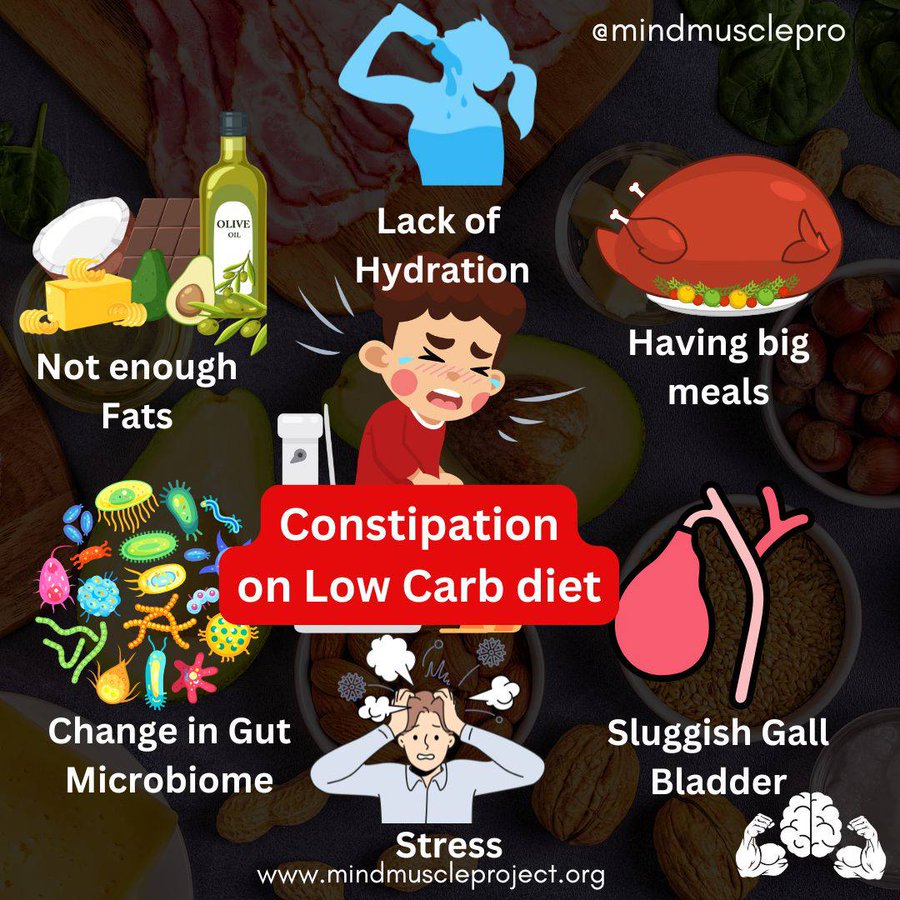Table of Contents
One of the most common challenges people face when transitioning to a low-carb or ketogenic diet is constipation. While it can be frustrating, understanding the underlying causes can help you manage and overcome this issue effectively.
Why Does Constipation Happen on Low-Carb Diets? #
Here are some common reasons and actionable solutions:
1. Dehydration #
- Why It Happens: On a low-carb diet, your body retains less water and minerals due to reduced insulin levels, leading to dehydration.
- Solution:
- Hydrate better by drinking more water throughout the day.
- Include electrolyte-rich options like bone broth or add a pinch of salt to your water.
2. Low Fat Intake #
- Why It Happens: Fat acts as a natural lubricant for your digestive system. If you’re not consuming enough fat, constipation can occur.
- Solution:
- Increase your intake of healthy fats like:
- Ghee
- Butter
- Coconut Oil
- Extra Virgin Olive Oil
- Remember, low-carb diets work best when paired with adequate fat intake.
- Increase your intake of healthy fats like:
3. Eating Large Meals #
- Why It Happens: If you’re combining intermittent fasting with a low-carb diet, you might end up consuming one or two large meals. This can overwhelm your digestive system.
- Solution:
- Break your meals into smaller portions within your eating window.
- Consider digestive enzyme supplements to aid in better digestion.
4. Stress #
- Why It Happens: Stress activates the sympathetic nervous system (“fight or flight”), which can inhibit digestion. A relaxed parasympathetic state is essential for smooth bowel movements.
- Solution:
- Reduce stress through mindfulness practices like yoga, meditation, or breathing exercises.
- If stress is caused by a rapid diet transition, consider gradually increasing your carb intake for a smoother adjustment.
5. Not Enough Vegetables #
- Why It Happens: While low-carb diets often restrict high-carb vegetables, inadequate fiber intake can lead to constipation for some individuals.
- Solution:
- Add low-carb, fiber-rich vegetables like:
- Spinach
- Broccoli
- Cauliflower
- Zucchini
- These can help bulk up your stool and improve regularity.
- Add low-carb, fiber-rich vegetables like:
6. Sluggish Gallbladder #
- Why It Happens: If bile flow from the gallbladder is inadequate, fat digestion can slow down, leading to digestive discomfort.
- Solution:
- Eat smaller meals with moderate fat content to avoid overwhelming the gallbladder.
- Consider bile-supporting supplements or digestive enzymes.
7. Change in Gut Microbiome #
- Why It Happens: Switching from a high-carb to a low-carb diet alters your gut microbiome, which may temporarily disrupt bowel movements.
- Solution:
- Include fermented foods like yogurt, kimchi, sauerkraut, or kefir to support healthy gut bacteria.
- Be patient; your gut microbiome may take time to adapt.
Are You Truly Constipated? #
Before jumping to conclusions, consider whether you’re genuinely constipated or simply experiencing less frequent bowel movements.
- Less frequent bowel movements are normal when eating a nutrient-dense diet with less waste material.
- True constipation involves discomfort, straining, or hard, dry stools.
By addressing these factors, you can enjoy the benefits of a low-carb diet without the discomfort of constipation.





